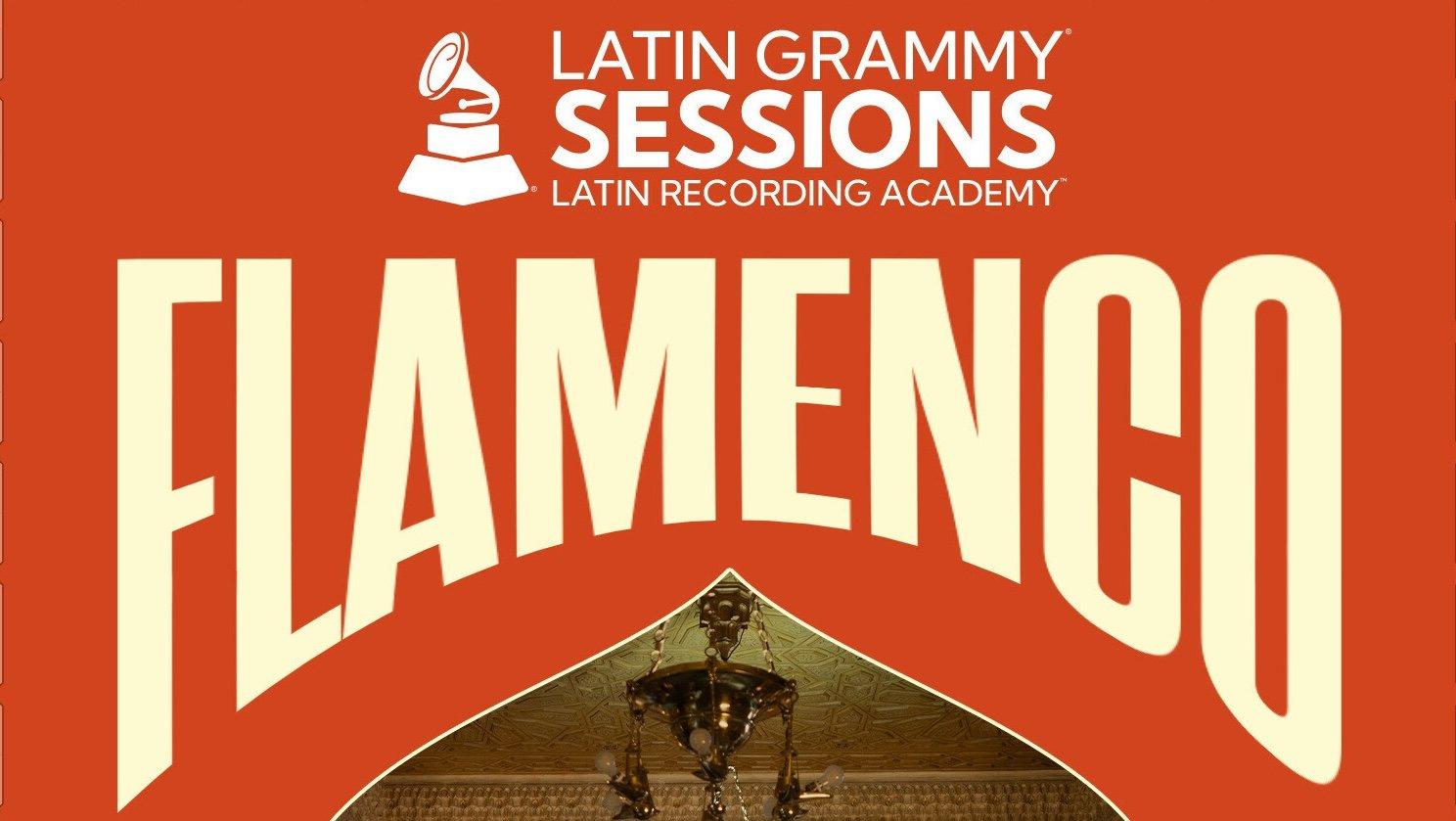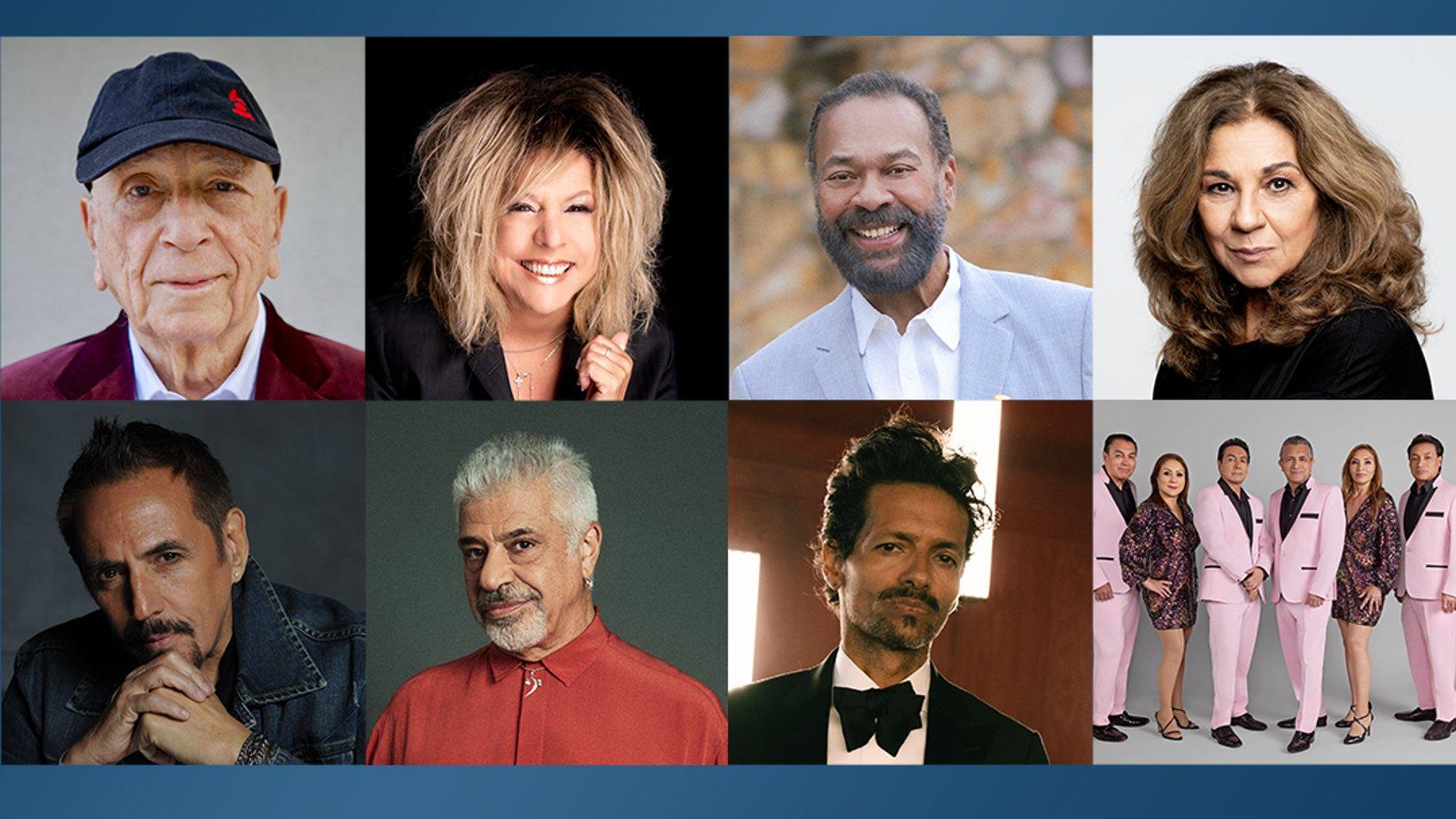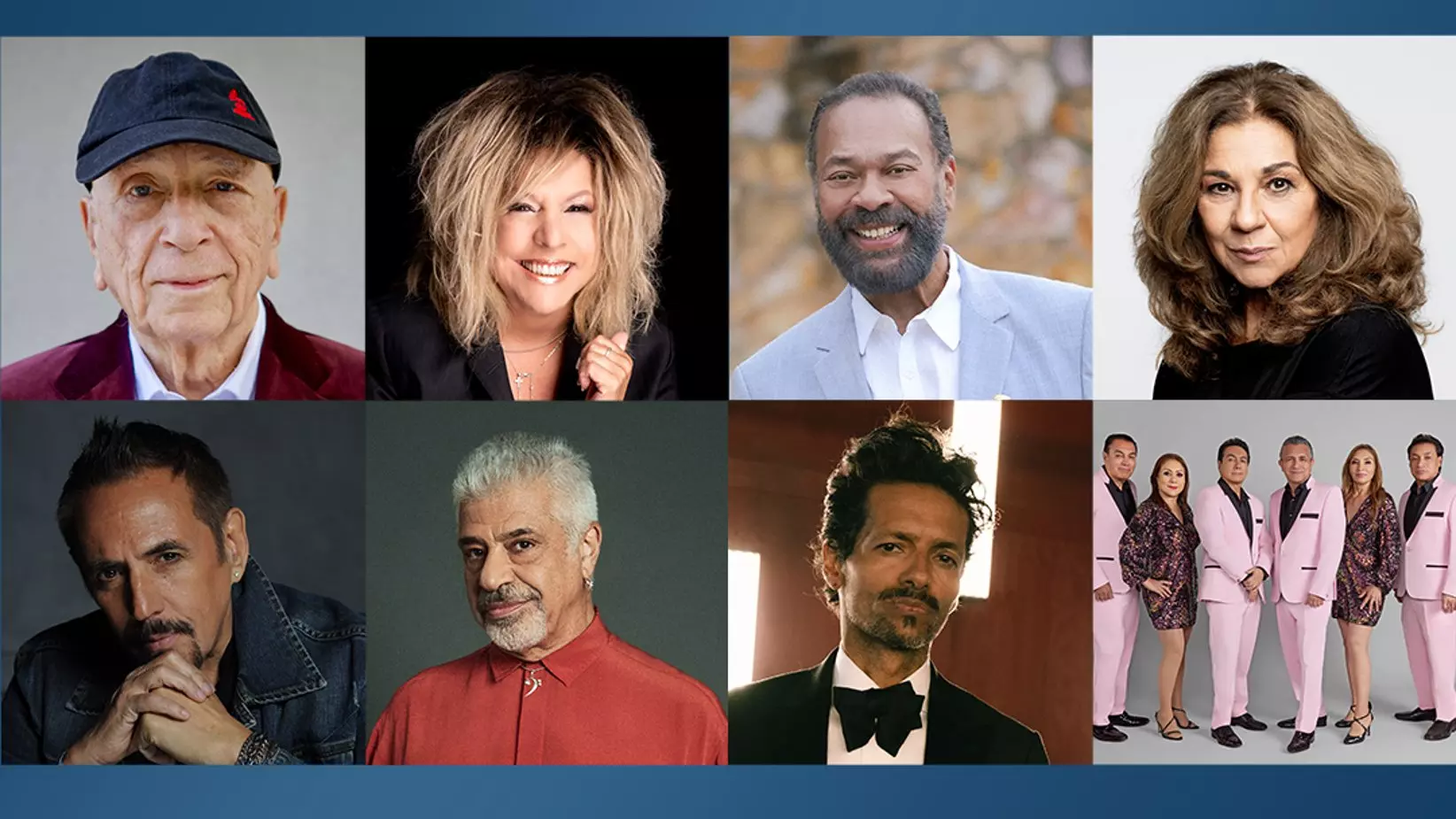Image courtesy of the Latin Recording Academy

news
Rewatch The Latin GRAMMY Sessions: Exploring The Soul And Identity Of Flamenco
A new audiovisual flamenco piece, tied to the 2023 Latin GRAMMYs, aired Friday, Nov. 10, as part of "The Latin GRAMMY Session" — and if you missed it, or want to revisit it, you can rewatch it below.
Flamenco is an indispensable part of the folkloric tapestry of the global music community And now, you can bask in a tribute to it — Latin GRAMMYs style.
A new audiovisual flamenco piece aired Friday, Nov. 10 at 8 a.m. EST, as part of "The Latin GRAMMY Session." The production showcased the cultural art and identity of Andalucia, while giving viewers a glimpse of the genre’s evolution. This piece was filmed in Grenada, at the UNESCO World Heritage Site and the Hotel Grande Palace.
The sessions dove into the flamenco classics and influence on emerging artists in this generation — while showcasing the architecture, beauty and history of the spaces all under the direction of Latin GRAMMY winner Javier Limón.
Featured artists in this session include Latin GRAMMY nominee Carmen Linares, recipient of the 2023 Lifetime Achievement Award, Latin GRAMMY winners Arcángel and Niña Pastori, alongside Lola Indigo, Alana Sinkëy, and Latin GRAMMY nominee Omar Montes, accompanied by dancer Belén López. You can watch the 52-minute presentation below:
Flamenco originated in Spain, where the 2023 Latin GRAMMYs will be held Thursday, Nov. 16, at the Conference and Exhibition Centre (FIBES) in Sevilla, Spain — the first-ever international show in Latin GRAMMY history.
This connects larger Spanish themes and cultural tie-ins to be seen at the 2023 Latin GRAMMYs. For instance, the Spanish cinematic legend, actor Antonio Banderas, will receive the President’s Award from the Latin Recording Academy at the ceremony. More information can be found below:
In celebration of the International Day of Flamenco, which is also Nov. 16, all five current nominees in the Best Flamenco Album category — Israel Fernández, Diego Guerrero, Omar Montes, Niña Pastori, and Juanfe Pérez — will come together for a special performance at the 2023 Latin GRAMMY Premiere. Delivering a once-in-a-lifetime homage to the genre, the historic musical performance will celebrate both flamenco and its native Spain, which this year hosts the Latin GRAMMY Premiere and the 2023 Latin GRAMMYs.
Keep checking GRAMMY.com for more information ahead of the 2023 Latin GRAMMYs on Thursday — and don’t hesitate to visit LatinGRAMMY.com as well.

Photo credits: Fabian Rincon Cano; Innercatfilms; Angel Peña Ramos; Javier Naval; Felix Limon; Nathalia Mahecha; Lorena Dini; FotosdeEstudio_PHGabrielMachado
news
The Latin Recording Academy Announces 2024 Special Awards Recipients: Los Ángeles Azules, Draco Rosa, Albita, Lolita Flores & More
The Latin Recording Academy's 2024 Special Awards honorees also include Alejandro Lerner, Lulu Santos, Ángel ‘Cucco’ Peña and Chucho Rincón. The honorees will be celebrated during Latin GRAMMY Week ahead of the 2024 Latin GRAMMYs.
The Latin Recording Academy today announced its 2024 Special Awards recipients: Albita, Lolita Flores, Alejandro Lerner, Los Ángeles Azules, Draco Rosa, and Lulu Santos will receive this year's Latin Recording Academy Lifetime Achievement Award as part of its annual Special Awards Presentation. Additionally, Ángel ‘Cucco’ Peña and Chucho Rincón will receive the Latin Recording Academy's Trustees Award.
The Lifetime Achievement Award is presented to performers who have made creative contributions of outstanding artistic significance to Latin music and its communities. The Trustees Award is bestowed on individuals who have made significant contributions to Latin music during their careers in ways other than performance. Both distinctions are voted on by the Latin Recording Academy's Board of Trustees.
“It is with great pride that we honor these musical legends — who continue redefining our Latin music and heritage — and we look forward to celebrating them as part of our Latin GRAMMY 25th anniversary festivities in November,” Latin Recording Academy CEO Manuel Abud said in a statement.
The honorees will be celebrated during a private event as part of Latin GRAMMY Week on Sunday, Nov. 10, in Miami, ahead of the 2024 Latin GRAMMYs. Alex Hadad will serve as executive producer of the Special Awards Presentation, working under the direction of the Latin Recording Academy’s production team led by Ayleen Figueras.
The 2024 Latin GRAMMYs, officially known as the 25th Latin GRAMMY Awards, will take place Thursday, Nov. 14, in Miami at Kaseya Center. The three-hour telecast will air live on Univision, Galavisión, and ViX on Thursday, Nov. 14, beginning at 8 p.m. ET/PT (7 p.m. CT), preceded by a one-hour pre-show starting at 7 p.m. ET/PT. Nominations for the 2024 Latin GRAMMYs will be announced Tuesday, Sept. 17.
The 2024 Latin GRAMMYs mark the 25th anniversary of the Latin GRAMMY Awards. This year, the Latin GRAMMYs will debut a new Field and two new Categories: Best Latin Electronic Music Performance, housed within the new Electronic Music Field, and Best Contemporary Mexican Music Album (Regional-Mexican Field).
Ahead of the 2024 Latin GRAMMYs, the Latin Recording Academy will host the official Latin GRAMMY Week 2024, which includes multiple events throughout Miami-Dade County, including marquee events like Leading Ladies of Entertainment, the Best New Artist Showcase, Special Awards Presentation, Nominee Reception, Person of the Year, and the Premiere Ceremony preceding the telecast. This year, 18-time Latin GRAMMY winner and two-time GRAMMY winner Carlos Vives will be honored as the 2024 Latin Recording Academy Person of the Year. More details on the official Latin GRAMMY Week 2024 events and calendar will be announced in the coming months.
Learn more about the Latin Recording Academy’s 2024 Special Awards recipients below:
2024 Lifetime Achievement Award Honorees
Albita (Cuba)
One of the most exuberant ambassadors of Latin culture in the United States, Latin GRAMMY-winner Albita has championed the rollicking beauty of Cuban music since the release of her debut album in 1988. The daughter of a popular folk duo, Albita Rodríguez was born in Havana in 1962. Noted for the fiery combustion of her vocal cords and a precise understanding of Cuban musical tradition, Albita reignited her career after she left Cuba and moved to Miami in 1993. Her breathtaking live performances at Florida nightclubs resulted in a recording contract with Emilio Estefan’s Crescent Moon label.
Released in 1995, her U.S. debut, No Se Parece A Nada, included one of her biggest hits: the brassy tropical anthem “Qué Manera de Quererte,” as well as a velvety bolero — a genre in which she also excels. A prolific songwriter, Albita built up a prodigious discography of original material, fusing the essence of son cubano with traditional trova and balada. The hostess of a highly successful television show, “La Descarga Con Albita,” she also showcased her formidable acting chops in productions of the Broadway musicals “The Mambo Kings,” “Carmen La Cubana,” and “Havana.” Albita continues actively recording new music and performing in front of enthusiastic audiences all over the world.
Lolita Flores (Spain)
María Dolores González Flores was born in Madrid in 1958 and was only 17 when she released a hugely successful debut album, Amor, Amor. In 1976, her second album featured the smash “No Renunciaré,” an impossibly nostalgic balada marked by an ornate arrangement and her gritty performance. During the 1980s, Lolita became a beloved pop star throughout the Americas, and in the 1990s, she developed a parallel career as an award-winning actress and television presenter. The daughter of singers Lola Flores and Antonio González ‘El Pescaílla’ and sister of Rosario and the late Antonio Flores, Lolita found a distinctive personal approach anchored on the gorgeous texture of her vocals and an eclectic repertoire that never ceases to surprise. In 2001, the album Lola, Lolita, Lola triumphed with an irresistible cover of the Cuban standard “Sarandonga,” which her father had recorded in 1966. In later decades, Lolita expanded her palette with sophisticated albums such as 2007’s Sigue Caminando, which veered into bossa nova, jazz, and pop-rock.
Alejandro Lerner (Argentina)
A thoughtful singer/songwriter anchored on his impeccable keyboard technique, Alejandro Lerner is the most covered Latin artist of his generation. Born in Buenos Aires in 1957, Alejandro Federico Lerner began his career as a teenager, playing with various legends of 1970s Argentine rock. Released in 1982, his solo debut, Alejandro Lerner Y La Magia, showcased the qualities that would soon garner him millions of fans: solid musicianship, the raw honesty of his lyrics, and a natural gift for evoking delicate, nocturnal moods. Inspired by Argentina’s return to democracy, 1983’s “Todo A Pulmón” was recorded by Spanish star Miguel Ríos and became an international hit. The mutual admiration that he shared with Mexican balada icon Armando Manzanero resulted in several successful tours together. Alternating between his native Argentina and Los Angeles, Lerner collaborated with Carlos Santana on the 2002 album Shaman and toured with the guitarist. He has also worked with Carole King, Luis Miguel (on the 1996 mega-hit “Dame”), Celine Dion, Air Supply, Gino Vannelli, Paul Anka, Alan Parsons, and Barry Gibb, among many other luminaries. In 2005, he was enlisted by Disney to perform the songs in the Spanish version of Chicken Little and to compose an original song for the closing credits of the animated film. A tireless performer, Lerner is still active in the recording studio and tours sold-out venues across the Americas.
Los Ángeles Azules (Mexico)
Founded in the Mexico City municipality of Iztapalapa in 1976 by the siblings of the Mejía Avante family, the group released their debut album in 1982. But it was in 1996 that the orchestra became a fundamental part of Mexican cumbia with “Cómo Te Voy A Olvidar.” Noted for their openness to collaborate with artists from other genres, Los Ángeles Azules revolutionized their sound — and the Latin music business — in 2013 by teaming up with legends from the Latin alternative field: Caifanes’ Saúl Hernández, Fabulosos Cadillacs’ Vicentico, and Ximena Sariñana, to name a few. Subsequent duets with Natalia Lafourcade (the retro charm of “Nunca Es Suficiente” in 2018), Argentinian artists (the brilliant fusion of De Buenos Aires Para El Mundo in 2020), and Carlos Santana (2023’s funky single “A Todos Los Rumberos,” with Panteón Rococó) solidified the band’s reign as one of the most beloved acts in all of Latin music.
Draco Rosa (Puerto Rico)
The remarkable musical career of Draco Rosa encompasses many facets — from boy band superstar to iconic rock en español pioneer and global hitmaker — all of them informed by his virtuoso vision and protean talent. Born in Long Island, New York, in 1969 to Puerto Rican parents, the Latin GRAMMY-winning singer, songwriter, and multi-instrumentalist Robert Edward Rosa Suárez got his first taste of fame as a member of Menudo. After a brief stint with rock band Maggie’s Dream, Rosa released two fundamental albums that shaped the 1990s wave of Latin American rock: 1994’s Frío and 1996’s Vagabundo. Delving into the pop machinery with the desire to subvert any and all expectations, Rosa co-wrote “Livin’ la Vida Loca” and other pop smashes for former Menudo bandmate Ricky Martin and also produced songs for Julio Iglesias. Always invested in exploring new ground, he developed a solo career that switches effortlessly from epic alternative rock (2018’s Monte Sagrado) to soulful ambient sonics (2021’s Sound Healing 1:11). This year marked the release of Reflejos de Lo Eterno, a transcendent covers collection of Latin alternative classics.
Watch: Draco Rosa Talks On Tour Backstage Must-Haves | Herbal Tea & White Sofas
Lulu Santos (Brazil)
A prodigiously talented guitarist, singer, and composer able to infuse an ethereal sense of romance into every song he touches, Lulu Santos has spent the past five decades carving a distinguished path in Brazilian music. Born in Rio de Janeiro in 1953, Luiz Maurício Pragana dos Santos abandoned his studies in favor of the hippie movement and a music career. After founding the ambitious progressive rock outfit Vímana, Santos launched a solo career in 1982 with the album Tempos Modernos. The jangly self-titled track and the lush “De Repente Califórnia” epitomized the MPB aesthetic of the time: sunny pop-rock chords, oblique melodies, and echoes of new wave. His third LP, 1984’s Tudo Azul, established him as one of the key Brazilian rockers of the decade. Still, Santos’ tireless quest for novel forms of expression found him incorporating dance, funk, and R&B into his 1990s output. A passionate champion of fellow musicians, Santos released poignant albums revisiting the songbooks of fellow legends Roberto and Erasmo Carlos (2013) and Rita Lee (2017). He remains active in music, having recently released a new EP of remixes — Atemporal — in May 2024.
2024 Trustees Award Honorees
Ángel ‘Cucco’ Peña (Puerto Rico)
Marc Anthony. Celia Cruz. Willie Colón. Gilberto Santa Rosa. These are just a few of the many stars whose work was enhanced by the talent of composer, producer, and orchestrator Ángel ‘Cucco’ Peña, a living legend of Puerto Rican music. Born in Santurce in 1948, Peña attended Puerto Rico’s Conservatory of Music and later sharpened his skills as a performer with tropical ensemble Orquesta Panamericana. His ability to infuse his Puerto Rican roots into every recording he touched cemented his sterling reputation as a sympathetic collaborator of other artists. In 1993, he co-produced Willie Colón’s classic LP Hecho en Puerto Rico, including the salsa anthem “Idilio.” The late 1990s were a time of fiery creativity for Peña. He produced Marc Anthony’s third album, Contra la Corriente, took over the musical direction on Gilberto Santa Rosa’s live album En Vivo Desde El Carnegie Hall, and contributed to albums by Ricky Martin (the pop blockbuster Vuelve), Chayanne and Celia Cruz. The Latin GRAMMY winner has worked extensively in film, advertising and television specials and remains an active ambassador of Latin music.
Chucho Rincón (Mexico)
A prolific composer, producer and label executive, Latin GRAMMY winner Chucho Rincón is a pioneer of the Mexican recording industry and a guiding light within Latin music. Born in Ciudad Juárez, Chihuahua, in 1937, Jesús ‘Chucho’ Rincón Cárdenas grew up in Michoacán and learned to play the guitar at a young age. After moving to Mexico City and taking acting and voice lessons, he became the lead vocalist for the soulful Trío Los Aguilillas in 1956. Rincón left the band in favor of a solo career and began writing songs in 1962. His charismatic presence and musical expertise facilitated a transition into a musical director with several labels. Working for Capitol, he signed many artists, including a young Joan Sebastian, whose career he would continue to shepherd decades later. In 1988, Rincón moved with his family to Spain where he became the musical director of the Orfeón label. He has produced over 300 albums by stars such as Alejandro Fernández, Chavela Vargas, and La Sonora Santanera and composed more than 200 songs, including the mega-hit “Quén Pompó.” Rincón continues producing music as part of a creative team with his son Fabián.
The Latest News About Latin Music

On 'Mirada,' Ivan Cornejo Redefines The Sound Of Sad Sierreño And Helps Fans Heal Through Music

7 Artists Bringing Reggaeton Mexa To The World: El Malilla, Bellakath & More

Revisiting 'Re': How Café Tacvba’s 1994 Masterpiece Changed Mexican Music Forever

The Latin Recording Academy Announces 2024 Special Awards Recipients: Los Ángeles Azules, Draco Rosa, Albita, Lolita Flores & More

Nelly Furtado On How Remix Culture, ADHD & Gen Z Inspired Her New Album '7'

Photo: Arenovski
feature
Peso Pluma's Road To 'ÉXODO': The GRAMMY Winner Navigates The Consequences Of Global Stardom On New Album
"Fans really get to see the other side of the coin; there are two sides to me. It's darker, rawer," Peso Pluma says of his latest album 'ÉXODO'
Peso Pluma marked his musical destiny with a Tupac tribute tattoo in the center of his clavicle: "All Eyez On Me."
The Mexican artist, born Hassan Emilio Kabande Laija, doesn't remember exactly what year he inked his chest. He knows it was well before his debut in music. Those four words reflected Peso's irrefutable confidence that the world's eyes would eventually be on him.
The world's eyes are indeed on Peso Pluma. In less than two years, the singer achieved global fame by singing corridos tumbados, traversing a path never before trodden by a música Mexicana artist.
At 25, Peso Pluma is at the forefront of a new generation of música Mexicana artists that have successfully modernized traditional Mexican rhythms, such as corridos, by infusing them with elements from urban music and a hip-hop aesthetic. The weight of representing an entire genre and a country could be great for some. But pressure doesn't affect Peso Pluma; on the contrary, it motivates him to keep working to exalt his roots.
"We've come a long way, but we still have a long way to go. And that doesn't mean we have to slow down; it doesn't mean everything is over. This is the beginning of everything," Peso Pluma said in a TikTok video before a performance at the Toyota Arena in Ontario, Canada, a little over a year ago.
Out June 20, Peso's extensive new album ÉXODO seeks to cement his global star status further. Over 24 tracks, the singer continues to explore corridos tumbados and digs into his urban side via much-awaited collaborations with reggaeton and hip-hop icons. Among those big names is Peso's teenage idol, the American rapper and producer Quavo, as well as further afield collaborations with Cardi B.
"ÉXODO is a project I've been working on for over a year before we even won the GRAMMY. GÉNESIS was an incredibly special project, and I knew we couldn't make the same diamond twice," the singer tells GRAMMY.com in a written interview.
Peso Pluma's path to the global stage has been lightning-fast. While he started releasing songs in 2020, Peso will remember March 2023 as the month that propelled him into global mega-stardom. His collaboration with Eslabón Armado on "Ella Baila Sola" led him to become a household name outside his native Mexico.
The hit resonated with an audience eager for new sounds, accompanying social media videos and surpassing a billion streams on Spotify. "Ella Baila Sola" became the first Mexican music track to top the platform's global chart. On Billboard, it conquered No. 1 on the magazine's Global 200 chart for six weeks and reached the coveted No. 4 spot on the Hot 100 chart. The mega-hit took Peso Pluma and Eslabon Armado to make their Latin GRAMMY stage debut in November with an electrifying performance.
Another collaboration, "La Bebe (Remix)" with Mexican reggaeton artist Yng Lvcas, released a day after "Ella Baila Sola," also contributed to Peso Pluma's virality in a completely different genre, but one in which he feels comfortable: urban music.
Learn more: Peso Pluma's 10 Biggest Collabs: From "Bzrp Sessions" To "Ella Baila Sola" &"Igual Que Un Ángel"
As Peso Pluma gained traction with a global audience, his February 2022 single with Raúl Vega, put him, for better or worse, on the map in Mexico. The warlike content of "El Belicón" lyrics and video clip attracted attention for the way it allegedly promoted narcoculture.
Despite growing criticism, Peso Pluma remained tight-lipped regarding references to high-profile members of the Mexican drug trade, as well as drug use and trafficking. In a rare admission to GQ magazine, the singer explained this is a "delicate subject to talk about, but you have to touch on it with transparency — because it's the reality of things."
"In hip-hop, in rap, just like in corridos, and other urban music like reggaeton, it talks about reality. We're not promoting delinquency at all. We're only talking about things that happen in real life," the singer explained.
With the success of "El Belicón" and "Ella Baila Sola" under his belt, Peso Pluma released GÉNESIS in June 2023. Despite being his third album, Peso considers it his true debut in music.
"I didn't want to delete my previous albums [Efectos Secundario and Ah Y Que?] because they represent my beginnings," Peso told Billboard in a cover story published a few weeks after the release of GÉNESIS. In the same conversation, the singer said he saw himself winning his first GRAMMY and breaking more records.
Read more: 5 Takeaways From Peso Pluma's New Album 'GÉNESIS'
In February 2024, Peso Pluma did just that. He took home the golden gramophone for Best Música Mexicana Album (Including Tejano) — his first GRAMMY Award. This victory didn't weigh on him as he approached his next production. "It pushed me to want to create something different that the fans haven't heard from me before," Peso Pluma tells GRAMMY.com.
While GÉNESIS and ÉXODO may differ in substance, they share similarities beyond music. That both records pull from the Bible for their names is not a random occurrence; the opening book of the Hebrew and Christian Bible delves into the genesis of creation, while the Book of Exodus explores the themes of liberation, redemption, and Moses' role in leading the Israelites through the uncharted waters of the Red Sea.
"ÉXODO is the continuation of GÉNESIS, which was the beginning," Peso Pluma explains to GRAMMY.com. "ÉXODO means new beginnings, a new era for me. We are preparing for the next chapter, and that's what we are doing for Mexican music, paving the way, laying the groundwork for what's next because it doesn't stop here."
His "sophomore" album is divided into two discs: the first is corridos, and the second is urban. It also continues the line of collaborations, with twenty tracks where Peso Pluma shares the limelight.
"Some of my fans were craving música Mexicana, and some were craving urbano, and I wanted to give them everything while still staying true to myself and choosing songs and lyrics that spoke to me," he continues.
ÉXODO's disc one starts with "LA DURANGO," the album's fourth single, featuring Eslabon Armando and Junior H. In the record, he also invites collaborators such as Natanael Cano and Gabito Ballesteros for "VINO TINTO" and Mexican rising star Ivan Cornejo on the melancholic "RELOJ," among others.
For Side B, Peso enlisted heavyweights from the urban genre in the Anglo and Latin markets: Anitta in the steamy "BELLAKEO," Rich The Kid in the bilingual "GIMME A SECOND," and Quavo in the existential trap "PA NO PENSAR." Cardi B, Arcángel, Ryan Castro, Kenia OS, and DJ Snake complete ÉXODO's genre crossover.
In ÉXODO, luxury, drugs, alcohol, and women continue to take center stage in the lyrics, accompanied by fast-paced guitar-driven melodies and reverb-dense vocals. However, the production sheds light on the vulnerable side of Peso and explores the unexpected consequences of becoming globally famous.
"Fans really get to see the other side of the coin; there are two sides to me. It's darker, rawer," Peso says about the record.
In the songs "HOLLYWOOD" and "LA PATRULLA," for example, Peso details how this musical path keeps him up at night, as well as his aspirations, and how he remains the same despite his success.
Perhaps one of the deepest and rawest songs on the album is "14:14," a track inspired by the Bible verse 14:14 from the Book of Exodus, which, the singer explains, was fundamental amidst the turbulence he faced on the way to global stardom.
"[The] verse 14:14 says 'The LORD will fight for you; you need only to be still.' This verse couldn't be truer," Peso Pluma says. "Over time, I learned to really trust in this and believe that some things are not up to me and I should trust the process."
In the song — one of the few on the album without a collaboration — Peso references the challenges of his profession and how his faith has kept him afloat amid the vicissitudes. "Things from the job that no one understands/I hide the rosary under my shirt so I don't poison myself, so I don't feel guilty/because whatever happens, the Boss will forgive me," he sings.
In "BRUCE WAYNE," Peso Pluma croons about the passionate feelings his career arouses: "First they love you, and then they hate you/wishing the worst, envy and death," the song says.
The singer resorts to comparing himself to a superhero figure again. In an unusual twist, Peso crosses comic universes, moving from his now traditional reference to Spider-Man to one from the DC Comics world: Bruce Wayne, Batman's secret identity. A wealthy man, part of Gotham's high society, Bruce Wayne is known for transforming his darkness into power while remaining reserved and isolated.
"Everyone has two sides of them, even me," Peso tells GRAMMY.com. "Peso Pluma on stage is a high-energy person, someone who is powerful and dominates a show and isn't afraid of anything. And then there is Hassan, who's chill and more relaxed and who deals with all the realities of life."
During the year and a half it took him to complete ÉXODO, Peso Pluma had to deal with the diverse nuances of a global star's life, including a widely publicized breakup from Argentine rapper/singer Nicki Nicole, the cancellation of one of his shows in October 2023 after a Mexico drug cartel issued a death threat against him, and a media frenzy over his alleged admission to a rehabilitation clinic, the latest a rumor he laid to rest during a March interview with Rolling Stone for his Future of Music cover story.
"The reality is, all these days, I've been in the studio working on ÉXODO," the artist explained to Rolling Stone.
Most of 2023 was a successful balancing act for Peso Pluma, who combined touring, an album release, rare media engagements, two Coachella appearances, all the while developing another record. According to the singer, ÉXODO was created in Los Angeles, Miami, New York, and Mexico. "We go to the studio everywhere!" Peso says. "It doesn't really matter where we are; I love to get into the studio and work when we have free time."
Like GÉNESIS, ÉXODO will be released via Peso Pluma's Double P Records, of which he is the CEO and A&R. Much of the talent the Mexican singer has signed to his label took part in the album's production, and songwriting process.
"For the Mexican music side, I had the whole [touring] band with me; I like to have them involved in the process so that we can all give our input on how it sounds, discuss what we think needs to be changed, create new ideas," he explains.
Peso Pluma knows that echoing the success of 2023 is no easy task. He was the most streamed artist in the U.S. on YouTube, surpassing Taylor Swift and Bad Bunny, and was the second most-listened to Latin artist in the country, amassing an impressive 1.9 billion streams, according to Luminate.
Música Mexicana emerged as one of the most successful genres in 2023, witnessing a remarkable 60 percent surge in streaming numbers, adds Luminate's annual report, crediting Peso Pluma along Eslabon Armado, Junior H, and Fuerza Regida as part of this success.
Collaborations on and off the mic have undoubtedly played a significant role in the rise of Música Mexicana on the global stage. Peso knows that the key to continuing onward is teaming up with renowned artists inside and outside his genre.
"All of us coming together is what pushed música Mexicana to go global," the singer affirms. "We showed the world what Mexico has to offer, and now no one can deny the power and talent we have in our country."

Photo: Natalia Gw
news
Carlos Vives Named The 2024 Latin Recording Academy Person Of The Year: What To Know About The Latin Music Icon
Vives will be honored at a star-studded gala leading up to the 2024 Latin GRAMMYs, which this year marks the 25th anniversary of the Latin GRAMMY Awards.
The Latin Recording Academy today announced that 18-time Latin GRAMMY winner and two-time GRAMMY winner Carlos Vives will be the 2024 Latin Recording Academy Person of the Year. He will be honored at a star-studded gala leading up to the 2024 Latin GRAMMYs, which this year marks the 25th anniversary of the Latin GRAMMY Awards.
The heartfelt tribute concert will honor Vives' celebrated career, which spans more than 30 years as a multifaceted singer and composer, and will feature renditions of his renowned repertoire performed by an array of notable artists and friends. In addition to his achievements in music, the 2024 Latin Recording Academy Person of the Year gala will honor Vives' continued commitment to environmental and social initiatives.
Details about the coveted event, which takes place during the 2024 Latin GRAMMY Week in Miami, will be announced at a later date.
An architect of Latin music's ongoing evolution and global expansion, Carlos Vives is one of the most respected artists in Spanish-language music around the world. He helped pioneer a new Latin American sound, redefining traditional Colombian vallenato by incorporating pop and rock. The first Colombian to win a GRAMMY Award, he boasts more than 10 billion streams on digital platforms, 20 million albums sold, and enduring hits like "La Gota Fría," "Pa' Mayte," "La Tierra Del Olvido," "Fruta Fresca" and "Volví A Nacer."
Vives has become an ambassador of Colombian and Latin American culture around the world, and his commitment also transcends the musical realm. In 2015, he created the Tras La Perla initiative to promote the sustainable development of Santa Marta and its ecosystem.
In addition, he created the Escuela de Música Río Grande to offer artistic experiences to children and young people and founded the record label Gaira Música Local to promote new Colombian talent. As part of his ongoing commitment to music education, Vives has been a strong advocate and generous supporter of the Latin GRAMMY Cultural Foundation since its inception and sponsored its annual Prodigy Scholarship in 2018.
"Carlos Vives is one of the most prolific and beloved artists of our time, whose commitment to Latin music and support for the new generations truly personifies the values of our Academy," Latin Recording Academy CEO Manuel Abud said in a statement. "We honor him as our Person of the Year for his vast contributions to our musical heritage and for his many philanthropic initiatives."
"I am honored and moved to have been chosen as the 2024 Latin Recording Academy Person of the Year. It is the reward for an authentic journey, for a wonderful team, and, above all, it is the recognition of the musical spirits of our Latin American diversity," Vives said in a statement. "These spirits taught us to love and enrich our language, to take care of it, and to respect it in order to exalt humanity with it."
The Latin Recording Academy Person of the Year honors musicians and their artistic achievements in the Latin music industry as well as their humanitarian efforts. The past honorees are Laura Pausini (2023), Marco Antonio Solís (2022), Rubén Blades (2021), Juanes (2019), Maná (2018), Alejandro Sanz (2017), Marc Anthony (2016), Roberto Carlos (2015), Joan Manuel Serrat (2014), Miguel Bosé (2013), Caetano Veloso (2012), Shakira (2011), Plácido Domingo (2010), Juan Gabriel (2009), Gloria Estefan (2008), Juan Luis Guerra (2007), Ricky Martin (2006), José José (2005), Carlos Santana (2004), Gilberto Gil (2003), Vicente Fernández (2002), Julio Iglesias (2001), and Emilio Estefan (2000).
Net proceeds from the Latin Academy Person of the Year Gala will go toward the charitable work of the Latin GRAMMY Cultural Foundation.
The 2024 Latin Recording Academy Person of the Year gala will take place days ahead of the 2024 Latin GRAMMYs, which take place Thursday, Nov. 14, in Miami at Kaseya Center, in partnership with Miami-Dade County and the Greater Miami Convention & Visitors Bureau (GMCVB). The nominations for the 2024 Latin GRAMMYs will be announced Tuesday, Sept. 17.
This year, the Latin Recording Academy will introduce two new Latin GRAMMY categories and a new field: Best Latin Electronic Music Performance, housed within the new Electronic Music Field, and Best Contemporary Mexican Music Album (Regional-Mexican Field). These additions also include several changes, including additional category amendments, to be added to the 2024 Latin GRAMMY Awards Process.
8 Essential Latin Electronic Releases: Songs And Albums From Bizarrap, Arca & More

Photo: Jathan Campbell
list
How Much Is A GRAMMY Worth? 7 Facts To Know About The GRAMMY Award Trophy
Here are seven facts to know about the actual cost and worth of a GRAMMY trophy, presented once a year by the Recording Academy at the GRAMMY Awards.
Since 1959, the GRAMMY Award has been music’s most coveted honor. Each year at the annual GRAMMY Awards, GRAMMY-winning and -nominated artists are recognized for their musical excellence by their peers. Their lives are forever changed — so are their career trajectories. And when you have questions about the GRAMMYs, we have answers.
Here are seven facts to know about the value of the GRAMMY trophy.
How Much Does A GRAMMY Trophy Cost To Make?
The cost to produce a GRAMMY Award trophy, including labor and materials, is nearly $800. Bob Graves, who cast the original GRAMMY mold inside his garage in 1958, passed on his legacy to John Billings, his neighbor, in 1983. Billings, also known as "The GRAMMY Man," designed the current model in use, which debuted in 1991.
How Long Does It Take To Make A GRAMMY Trophy?
Billings and his crew work on making GRAMMY trophies throughout the year. Each GRAMMY is handmade, and each GRAMMY Award trophy takes 15 hours to produce.
Where Are The GRAMMY Trophies Made?
While Los Angeles is the headquarters of the Recording Academy and the GRAMMYs, and regularly the home of the annual GRAMMY Awards, GRAMMY trophies are produced at Billings Artworks in Ridgway, Colorado, about 800 miles away from L.A.
Is The GRAMMY Award Made Of Real Gold?
GRAMMY Awards are made of a trademarked alloy called "Grammium" — a secret zinc alloy — and are plated with 24-karat gold.
How Many GRAMMY Trophies Are Made Per Year?
Approximately 600-800 GRAMMY Award trophies are produced per year. This includes both GRAMMY Awards and Latin GRAMMY Awards for the two Academies; the number of GRAMMYs manufactured each year always depends on the number of winners and Categories we award across both award shows.
Fun fact: The two GRAMMY trophies have different-colored bases. The GRAMMY Award has a black base, while the Latin GRAMMY Award has a burgundy base.
Photos: Gabriel Bouys/AFP via Getty Images; Frederick M. Brown/Getty Images
How Much Does A GRAMMY Weigh?
The GRAMMY trophy weighs approximately 5 pounds. The trophy's height is 9-and-a-half inches. The trophy's width is nearly 6 inches by 6 inches.
What Is The True Value Of A GRAMMY?
Winning a GRAMMY, and even just being nominated for a GRAMMY, has an immeasurable positive impact on the nominated and winning artists. It opens up new career avenues, builds global awareness of artists, and ultimately solidifies a creator’s place in history. Since the GRAMMY Award is the only peer-voted award in music, this means artists are recognized, awarded and celebrated by those in their fields and industries, ultimately making the value of a GRAMMY truly priceless and immeasurable.
In an interview featured in the 2024 GRAMMYs program book, two-time GRAMMY winner Lauren Daigle spoke of the value and impact of a GRAMMY Award. "Time has passed since I got my [first] GRAMMYs, but the rooms that I am now able to sit in, with some of the most incredible writers, producers and performers on the planet, is truly the greatest gift of all."
"Once you have that credential, it's a different certification. It definitely holds weight," two-time GRAMMY winner Tariq "Black Thought" Trotter of the Roots added. "It's a huge stamp as far as branding, businesswise, achievement-wise and in every regard. What the GRAMMY means to people, fans and artists is ever-evolving."
As Billboard explains, artists will often see significant boosts in album sales and streaming numbers after winning a GRAMMY or performing on the GRAMMY stage. This is known as the "GRAMMY Effect," an industry phenomenon in which a GRAMMY accolade directly influences the music biz and the wider popular culture.
For new artists in particular, the "GRAMMY Effect" has immensely helped rising creators reach new professional heights. Samara Joy, who won the GRAMMY for Best New Artist at the 2023 GRAMMYs, saw a 989% boost in sales and a 670% increase in on-demand streams for her album Linger Awhile, which won the GRAMMY for Best Jazz Vocal Album that same night. H.E.R., a former Best New Artist nominee, saw a massive 6,771% increase in song sales for her hit “I Can’t Breathe” on the day it won the GRAMMY for Song Of The Year at the 2021 GRAMMYs, compared to the day before, Rolling Stone reports.
Throughout the decades, past Best New Artist winners have continued to dominate the music industry and charts since taking home the GRAMMY gold — and continue to do so to this day. Recently, Best New Artist winners dominated the music industry and charts in 2023: Billie Eilish (2020 winner) sold 2 million equivalent album units, Olivia Rodrigo (2022 winner) sold 2.1 million equivalent album units, and Adele (2009 winner) sold 1.3 million equivalent album units. Elsewhere, past Best New Artist winners have gone on to star in major Hollywood blockbusters (Dua Lipa); headline arena tours and sign major brand deals (Megan Thee Stallion); become LGBTIA+ icons (Sam Smith); and reach multiplatinum status (John Legend).
Most recently, several winners, nominees and performers at the 2024 GRAMMYs saw significant bumps in U.S. streams and sales: Tracy Chapman's classic, GRAMMY-winning single "Fast Car," which she performed alongside Luke Combs, returned to the Billboard Hot 100 chart for the first time since 1988, when the song was originally released, according to Billboard. Fellow icon Joni Mitchell saw her ‘60s classic “Both Sides, Now,” hit the top 10 on the Digital Song Sales chart, Billboard reports.
In addition to financial gains, artists also experience significant professional wins as a result of their GRAMMY accolades. For instance, after she won the GRAMMY for Best Reggae Album for Rapture at the 2020 GRAMMYs, Koffee signed a U.S. record deal; after his first GRAMMYs in 2014, Kendrick Lamar saw a 349% increase in his Instagram following, Billboard reports.
Visit our interactive GRAMMY Awards Journey page to learn more about the GRAMMY Awards and the voting process behind the annual ceremony.
